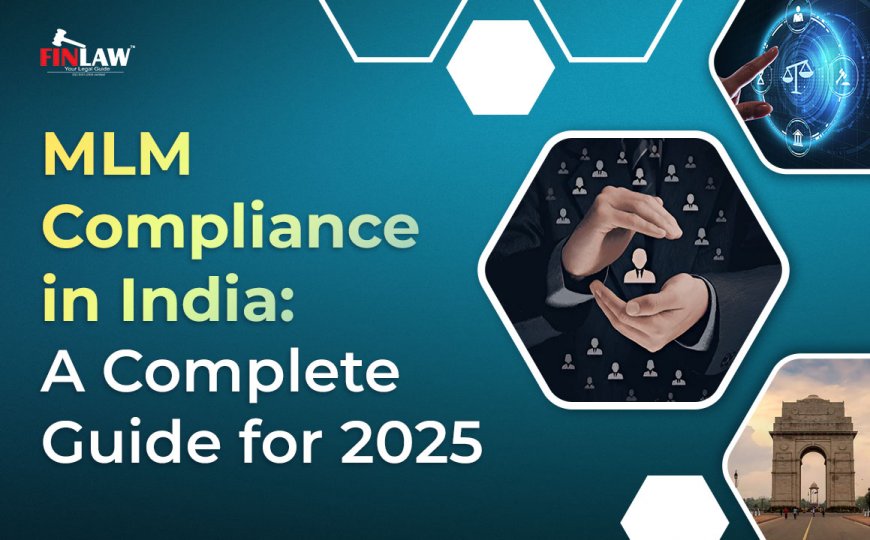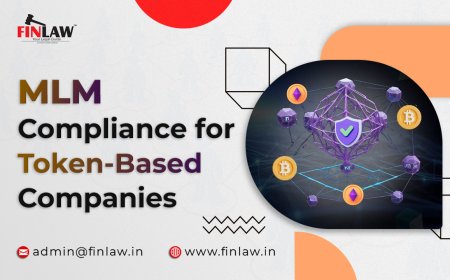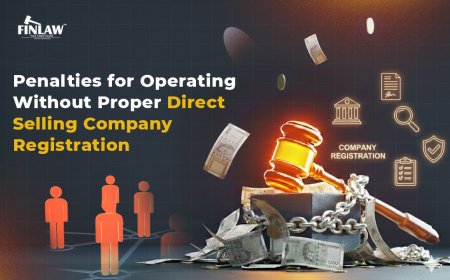MLM Compliance in India: A Complete Guide for 2025
Learn everything about MLM Compliance in India for 2025, including laws, registration, legal checks, and penalties. Stay compliant and grow legally.

1. Introduction: Why MLM Compliance Matters Now
In 2025, India’s direct selling and multi-level marketing (MLM) industry is under intense regulatory and consumer scrutiny. With increasing awareness and digital access, compliance is no longer optional. It forms the backbone of trust, credibility, and long-term sustainability. Non-compliance can lead to severe penalties, legal consequences, and loss of public confidence.
This guide offers a comprehensive view of MLM compliance in India, including current laws, registration requirements, operational do’s and don’ts, and future trends.
2. Legal Framework Overview
2.1 Prize Chits and Money Circulation Schemes (Banning) Act, 1978
This Act bans money circulation schemes that promise returns based on enrolling new participants rather than selling a product or service. Offenders may face imprisonment (up to 3 years) and fines. Many illegal MLM models have been prosecuted under this Act. However, genuine direct selling with transparent business models focused on product sales does not fall under its purview.
2.2 Consumer Protection (Direct Selling) Rules, 2021
Introduced under the Consumer Protection Act, these rules provide a structured compliance framework for direct selling businesses:
-
Mandatory registration of direct selling entities.
-
Self-declaration under Rule 4
-
30-day return or refund policy for customers.
-
Transparent product and compensation information.
-
No charges or fees for joining.
-
Strict prohibition on pyramid schemes.
-
Appointment of a grievance redressal officer.
2.3 State-Level Regulations
Some states like Kerala have issued their own rules or advisories around VAT, welfare fund registration, and other localized requirements. It’s essential to verify state-level regulations based on where your MLM business operates.
3. Step-by-Step MLM Compliance Checklist for 2025
3.1 Business Registration and Financial Compliance
-
Register your entity as a Private Limited, LLP, or Partnership with the Ministry of Corporate Affairs.
-
Obtain PAN, TAN, GST number, and Shops & Establishment License.
-
Apply for FSSAI license (if applicable for product types like food, supplements, etc.)
-
Consider trademark registration to protect brand identity.
3.2 Registration under Direct Selling Rules
-
Submit mandatory self-declaration under Rule 4 to the Department of Consumer Affairs (DoCA).
-
Maintain a detailed website with product information, pricing, and policies.
-
Ensure compliance with Rule 5 documentation.
3.3 Ethical Compensation Structures
-
Base all commissions solely on actual product sales, not on the number of new recruits
-
Present clear, verifiable income disclosures to new distributors.
-
Avoid exaggerating income potential or success stories.
3.4 Transparent Consumer Disclosures
-
Clearly disclose all product details, including price, usage, and terms of warranty
-
Offer a 30-day cooling-off period or return/refund window
-
Provide invoices for every transaction
3.5 Data Privacy and IT Compliance
-
Adhere to provisions of India’s IT laws, especially regarding digital communications
-
Store consumer and distributor data securely and in compliance with applicable data protection norms
3.6 Grievance Redressal Mechanism
-
Appoint a Nodal Officer responsible for consumer grievance handling.
-
Display contact details on your company’s website.
-
Ensure all consumer complaints are resolved within 45 days.
3.7 Internal Audits and Reporting
-
Conduct regular compliance audits of distributor activities and commissions
-
Maintain accurate books of accounts, stock records, and transaction logs
-
Be prepared for regulatory inspections
3.8 Distributor Training and Ethics
-
Create and distribute onboarding material covering rules, product training, and compliance
-
Prohibit misleading sales pitches, coercive recruitment tactics, or misinformation
-
Implement regular refresher training modules
3.9 Product Certifications and Approvals
-
Ensure all products sold meet industry quality standards and required certifications (FSSAI, ISO, etc.)
-
Label products with batch numbers, expiration dates, and instructions.
4. Spotting Legal Grey Areas
4.1 Identifying Money Circulation Schemes
If your MLM business model pays commissions based purely on recruitment rather than product sales, it likely qualifies as an illegal money circulation scheme under the 1978 Act.
4.2 Pyramid Scheme Red Flags
Warning signs include:
-
High joining fees with promises of huge returns
-
Focus on enrolling new members over product movement
-
Lack of product or overpriced, low-value products
4.3 Regulatory Disputes at the State Level
Some states have initiated criminal actions against MLM companies under pyramid scheme allegations, leading to business disruptions and legal battles. It is critical to stay updated on state-specific requirements.
5. Real-World Compliance Cases
Amway India
One of the largest direct selling companies, Amway India has faced scrutiny over its business practices. It was subject to multiple investigations and had to restructure operations to comply with Indian regulations.
QNet India
QNet was charged in multiple states under pyramid scheme allegations. The company maintained its legality by focusing on product-based commissions and strengthening its legal defenses. The case highlights the importance of transparency and clear distinction between legal MLM and banned schemes.
6. Emerging Trends and Future Outlook
6.1 Potential Central Regulation
There’s growing momentum for a centralized law to regulate the MLM and direct selling industry, possibly through an amendment or a standalone Direct Selling Act.
6.2 Use of Technology
Automation tools like CRM platforms, e-KYC verification, and blockchain for commission tracking are becoming standard practices to ensure compliance.
6.3 Consumer Awareness
Today's consumers are far more informed. Ethical sales practices, honest income disclosures, and transparent refund policies are not just legal requirements but key to business reputation.
6.4 Compliance-Driven Recruitment
MLM companies are expected to implement background checks and offer compliance training before allowing a person to become a distributor.
7. Penalties for Non-Compliance
Violating MLM compliance norms in India may lead to:
-
Fines and imprisonment under the Prize Chits and Money Circulation Schemes Act.
-
Business bans, blacklisting, or license cancellations by regulators.
-
Asset seizures and raids by enforcement agencies.
-
Long-term damage to brand reputation and customer trust.
8. Compliance Roadmap: Action Plan for 2025
|
Step |
Task |
Responsible |
|
1 |
Business incorporation & tax registration |
Founders, Legal team |
|
2 |
DoCA registration & self-declaration |
Compliance Officer |
|
3 |
Transparent compensation plan creation |
HR, Legal |
|
4 |
Product and refund policy disclosures |
Marketing |
|
5 |
Training programs for distributors |
Training Department |
|
6 |
Grievance redressal system implementation |
Customer Support |
|
7 |
Periodic audits & document review |
Internal Audit |
|
8 |
Monitoring of state-specific updates |
Legal Advisor |
9. Frequently Asked Questions (FAQs)
Q1. Is MLM legal in India?
Yes, provided the business operates under a legal entity, follows Consumer Protection (Direct Selling) Rules, 2021, and bases income on product sales rather than recruitment.
Q2. Do I need to register with the government?
Yes, MLM businesses must register with the Department of Consumer Affairs and submit a self-declaration under Rule 4.
Q3. What is the cooling-off period for consumers?
A 30-day return or refund policy must be offered to consumers and distributors.
Q4. Are pyramid schemes and MLM the same?
No. Pyramid schemes are banned in India. Legal MLMs focus on product-based selling and transparent commissions.
Q5. Can I collect joining fees from new distributors?
No. As per the rules, no participant should be required to pay any entry or registration fee to join a direct selling business.
Conclusion
In 2025, MLM compliance in India is not just about ticking legal boxes—it’s about building a business model that is sustainable, ethical, and consumer-focused. From registration and disclosures to transparent commissions and grievance handling, every compliance step enhances trust and legal credibility.
By aligning your MLM company with the regulatory framework and ethical best practices outlined in this guide, you can secure your brand’s future and thrive in India’s growing direct selling ecosystem.
What's Your Reaction?



















